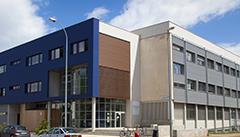
Sciences & Société
Soutenance de thèse : Sekinat YAHYA
Une étude des défis de consommation d'énergie dans les services de réalité étendue sur les réseaux cellulaires
Doctorante : Sekinat YAHYA
Laboratoire INSA : CITI - Centre d'innovation en Télécommunications et Intégration de Services
École doctorale : ED n°512 lnfoMaths - Informatique et Mathématiques de Lyon
Extended reality (XR) services are characterised by their heavy computational requirements throughout their life cycle. XR comprises multiple traffic modes consisting of 3D video and audio, haptics, sensor and pose information. Systems-related challenges relating to the creation, encoding, transmission, rendering and presentation of the application data from this class of services have increasingly become key areas of research inquiry from both a computational and energy viewpoint. Recently, new provisions have been made across different relevant standards to improve the capacity of these applications on mobile cellular networks. Our research investigates the energy-related challenges at both the RAN and UE levels. We conduct our evaluations using system-level simulations (SLS) that adhere to the parameter specifications established by standardisation bodies. We begin with a RAN-level energy reduction plus XR application enhancement strategy. With the cell switch off (CSO) technique proposed for BS deployment energy efficiency at low load, we evaluate the impact of an XR-capacity improvement criterion on the energy savings obtainable. Our analysis covers a European urban city using data from a European operator and system-level simulations according to the standard network operations. ln XR, UE energy-saving schemes are especially important since current delivery devices are still in early commercial development, making battery-saving techniques crucial. ln this thesis, we use the Rel-18 improvements on the discontinuous reception (DRX) UE energy saving mechanism through state-of-the-art prediction algorithms to propose a traffic prediction-based non-integer DRX mechanism. We achieved significant energy savings without impeding the XR quality of service requirements. Lastly, towards enhancing the capacity of XR on cellular networks in energy-saving mode, we propose a DRX plus QoE-aware scheduler (DQAS). Using SLS according to 3GPP specifications on XR QoE requirements, traffic model, and dense urban deployment scenarios, and following real traces from XR applications, we first evaluate a QoE-aware scheduler (QAS) for XR services. We introduced DRX awareness into QAS, jointly optimising XR QoE and energy consumption. We analysed our results to identify the parameter window in which both metrics can be optimally improved towards achieving the goal of XR capacity improvement on cellular networks.
Información adicional
-
Amphithéâtre Claude Chappe, Bâtiment Hedy Lamarr, 6 avenue des Arts, 69621 Villeurbanne Cedex

